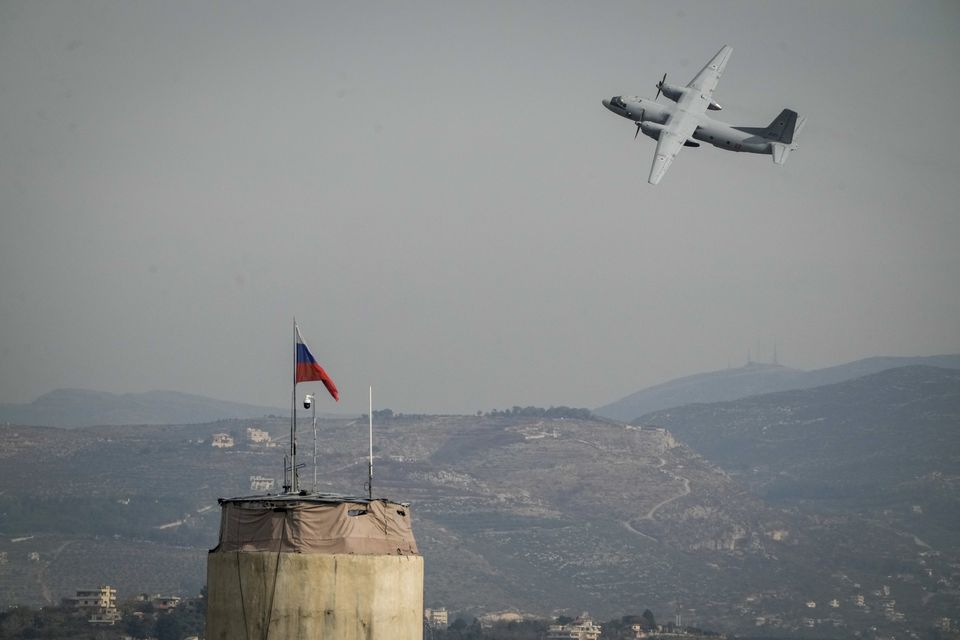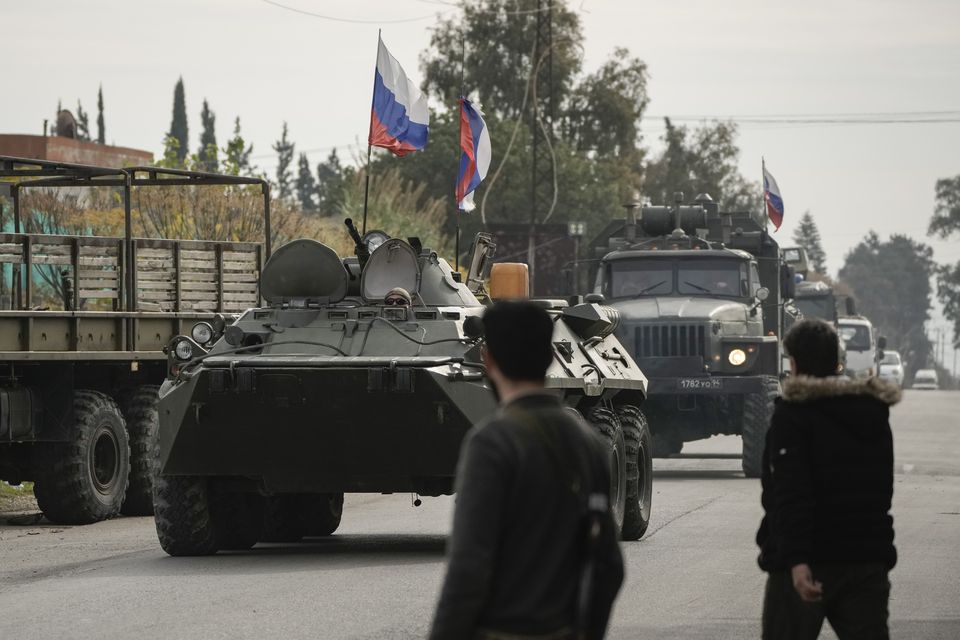A lengthy convoy of Russian military vehicles rolled down the road heading towards the Syrian city of Tartous on Monday, as soldiers stood guard.
Planes periodically landed and took off from Russia’s Hmeimim air base in the Syrian coastal province of Latakia, while smoke rose from inside the base. It was unclear what was burning.
In the streets of Hmeimim, a bucolic town dotted with orange groves, many of the shops have signs in Russian, a nod to the significance of the Russian military presence in the area.
But whether and how long that presence will last after the fall of former Syrian president Bashar Assad is now an open question.
A Russian aircraft takes off at Hmeimim Air Base (Leo Correa/AP)
Russia’s scorched-earth intervention on behalf of its ally, Mr Assad, once turned the tide of the Syrian civil war.
In 2017, Mr Assad’s government signed a deal with Russia that offered it a free lease of Hmeimim air base and the Tartous naval base for 49 years.
But opposition forces in the country’s northwest launched a shock offensive last month that once again threatened Mr Assad’s rule.
Moscow largely stood aside, although it has granted asylum to the former president and his family.
On Monday, in his first public statement since his ousting, Mr Assad said that he had left Damascus to the Hmeimim air base on December 8 after insurgents stormed the capital, but had not planned to flee the country.
He said that after the base came under attack by drones, the Russians decided to evacuate him to Russia.
Since his departure, there have been no clashes between Russian troops and the former insurgents who have suddenly become the de facto security forces for all of Syria.
Syrian fighters watch Russian armoured vehicles driving past near the Hmeimim Air Base (Leo Correa/AP)
That is despite the fact that many of the fighters are from areas of northern Syria that came under frequent Russian bombardment and have little love for Moscow.
A fighter guarding the shuttered civilian airport next to the Hmeimim base said on Monday: “The Russians are preparing to withdraw from Syria, God willing.”
He gave only his nickname, Abu Saif, because he was not authorised to comment publicly.
Russian forces have pulled out of some areas of Syria. Russian forces and military vehicles were seen withdrawing from southern Syria on Friday towards their primary base in the city of Latakia.
On Thursday, the British-based Syrian Observatory for Human Rights reported that Russian forces were leaving bases in Ain Issa and Tel Al-Samn in the Al-Raqqah countryside.
Satellite images released by Maxar Technologies on Friday show what appear to be cargo planes at a Russian military airfield in Syria with their nose cones opened to receive heavy equipment, with helicopters being dismantled and prepared for transport.
But even as Russian President Vladimir Putin granted Mr Assad and his family asylum in Russia, Moscow approached the new Syrian authorities to try to ensure the security of its bases and to extend its forces’ stay.
The three-starred flag of the Syrian revolution was quickly hoisted at the Syrian embassy in Moscow in place of the old government’s two-starred flag.
Obeida Arnaout, spokesman for the political department of the new transitional government, in an interview on Monday called on Russia to reconsider its presence in Syria, but did not rule out the possibility that the Russian forces could remain.
“I think that Russia should reconsider its presence on Syrian territory as well as its interests,” he said.
“Their interests were linked to the criminal Assad regime. They can reconsider and take the initiatives to reach out to the new administration to show that they have no animosity toward the Syrian people, and that the era of Assad regime is finally over.”
Kremlin spokesman Dmitry Peskov said in a call with reporters on Monday that Moscow was discussing the issue with the new authorities.
“We are in contact with representatives of the forces that are currently in control of the situation in the country, and all of this will be determined in the course of dialogue,” Mr Peskov said.

